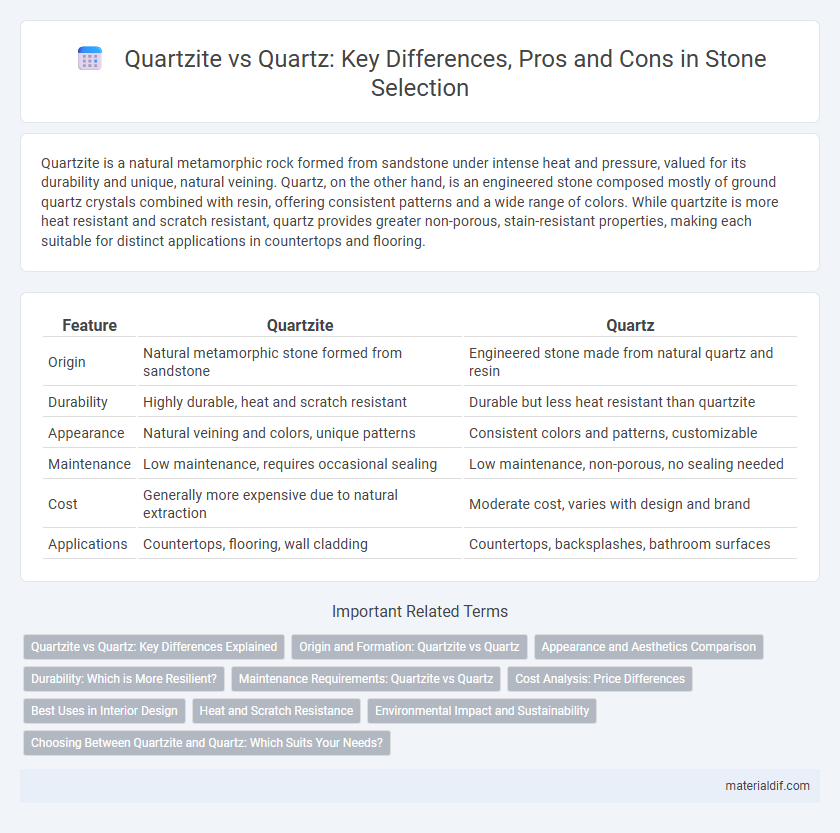Quartzite is a natural metamorphic rock formed from sandstone under intense heat and pressure, valued for its durability and unique, natural veining. Quartz, on the other hand, is an engineered stone composed mostly of ground quartz crystals combined with resin, offering consistent patterns and a wide range of colors. While quartzite is more heat resistant and scratch resistant, quartz provides greater non-porous, stain-resistant properties, making each suitable for distinct applications in countertops and flooring.
Table of Comparison
| Feature | Quartzite | Quartz |
|---|---|---|
| Origin | Natural metamorphic stone formed from sandstone | Engineered stone made from natural quartz and resin |
| Durability | Highly durable, heat and scratch resistant | Durable but less heat resistant than quartzite |
| Appearance | Natural veining and colors, unique patterns | Consistent colors and patterns, customizable |
| Maintenance | Low maintenance, requires occasional sealing | Low maintenance, non-porous, no sealing needed |
| Cost | Generally more expensive due to natural extraction | Moderate cost, varies with design and brand |
| Applications | Countertops, flooring, wall cladding | Countertops, backsplashes, bathroom surfaces |
Quartzite vs Quartz: Key Differences Explained
Quartzite is a natural metamorphic rock formed from sandstone under intense heat and pressure, characterized by its durability and resistance to heat and scratching, making it ideal for countertops and flooring. Quartz is an engineered stone composed of approximately 90% crushed quartz combined with resin and pigments, offering a non-porous, low-maintenance surface available in a wide range of colors and patterns. The key differences between quartzite and quartz lie in their origin, composition, maintenance requirements, and appearance, with quartzite offering natural veining and textures, while quartz provides uniformity and enhanced stain resistance.
Origin and Formation: Quartzite vs Quartz
Quartzite forms through the metamorphism of sandstone under intense heat and pressure, resulting in a dense, crystalline rock primarily composed of quartz minerals. Quartz is a crystalline mineral that naturally occurs as hexagonal crystals formed from the cooling and solidification of silica-rich magma or hydrothermal processes. While quartzite originates from sedimentary rock transformation, quartz forms independently as a mineral and often aggregates into various crystalline structures.
Appearance and Aesthetics Comparison
Quartzite showcases a natural, grainy texture with swirling patterns and varied color tones, often resembling marble, providing a unique and elegant appearance. Quartz features a more uniform and consistent look, available in a wide range of vibrant colors and patterns created through engineered manufacturing. The natural variation in quartzite enhances its aesthetic appeal for organic designs, while quartz offers predictable beauty for modern, sleek interiors.
Durability: Which is More Resilient?
Quartzite is a natural metamorphic stone formed from sandstone, boasting exceptional hardness and resistance to scratches and heat, making it highly durable for countertops and flooring. Quartz, engineered from crushed quartz mixed with resin, offers strong durability but is slightly less heat resistant and can be vulnerable to UV damage over time. For long-term resilience in high-traffic or heat-exposed areas, quartzite generally outperforms quartz with superior hardness and natural strength.
Maintenance Requirements: Quartzite vs Quartz
Quartzite is a natural stone requiring periodic sealing to maintain its resistance to stains and scratches, whereas quartz is engineered with resins, offering non-porous, low-maintenance surfaces that do not require sealing. Quartzite's maintenance involves gentle cleaning with pH-neutral cleaners and avoiding harsh chemicals, while quartz can be cleaned easily with mild soap and water. The durability of quartz reduces upkeep demands, making it suitable for busy kitchens, whereas quartzite's natural texture needs more attentive care to preserve its aesthetic appeal.
Cost Analysis: Price Differences
Quartzite typically commands a higher price than quartz due to its natural stone composition and labor-intensive quarrying process. Quartz, being an engineered stone, offers a more consistent price point and often costs 20-30% less than quartzite, making it a budget-friendly alternative. Cost differences also stem from durability and installation requirements, with quartzite demanding specialized handling that increases overall expenses.
Best Uses in Interior Design
Quartzite, a natural metamorphic stone, is ideal for high-traffic areas like kitchen countertops and flooring due to its durability and resistance to heat and scratches. Quartz, an engineered stone, provides a non-porous, low-maintenance surface perfect for bathroom vanities and backsplashes, with a wide variety of colors and patterns. Both materials enhance interior design by combining aesthetic appeal with practical benefits tailored to specific functional needs.
Heat and Scratch Resistance
Quartzite exhibits superior heat resistance compared to quartz, making it ideal for kitchen countertops exposed to hot pots and pans. Its natural metamorphic composition allows it to withstand high temperatures without damage, unlike engineered quartz, which can be sensitive to thermal shock due to resin content. In terms of scratch resistance, quartzite ranks higher with a Mohs hardness of 7, while quartz ranges from 6 to 7, but quartzite's natural stone surface often proves more durable against everyday wear and tear.
Environmental Impact and Sustainability
Quartzite, a natural metamorphic stone, has a lower environmental impact than engineered quartz because it requires less processing and energy consumption during extraction and fabrication. Engineered quartz, composed of approximately 90% natural quartz combined with resin and pigments, involves synthetic materials and chemicals that can increase its carbon footprint and complicate recycling efforts. Choosing quartzite supports sustainability by relying on a natural resource with minimal additives, whereas quartz production demands more industrial processing and energy input.
Choosing Between Quartzite and Quartz: Which Suits Your Needs?
Quartzite, a natural metamorphic rock formed from sandstone, offers exceptional durability and heat resistance, making it ideal for kitchen countertops and heavy-use areas. Quartz, an engineered stone composed of natural quartz crystals combined with resin, provides a non-porous, low-maintenance surface with a wide range of colors and patterns, suitable for stain and scratch resistance needs. Selecting between quartzite and quartz depends on priorities like natural aesthetics and heat tolerance versus consistency, design variety, and ease of cleaning.
Quartzite vs Quartz Infographic

 materialdif.com
materialdif.com